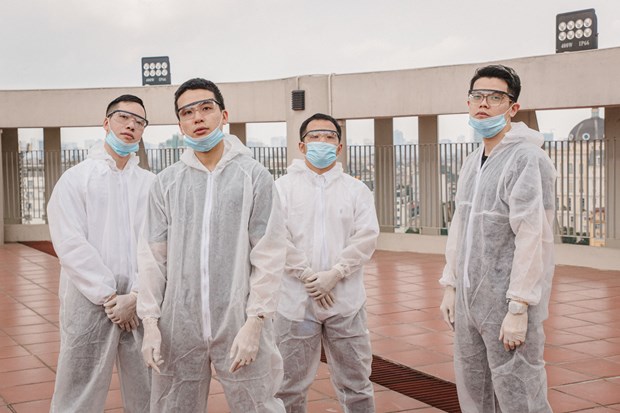The all-out war on fake news
Facing the boom of fake news amidst the COVID-19 pandemic, the Vietnam News Agency (VNA) has worked with the Da LAB band to reintroduce “rap news”, a creative type of news bulletin, via the video clip “Khong Fake News” (No Fake News).
 The rap video about fake news, performed by Da LAB, has generated a good effect amid the COVID-19 pandemic (Photo: VietnamPlus)
The rap video about fake news, performed by Da LAB, has generated a good effect amid the COVID-19 pandemic (Photo: VietnamPlus)Hanoi (VNA) - Facing the boom of fake news amidst the COVID-19 pandemic, the Vietnam News Agency (VNA) has worked with the Da LAB band to reintroduce “rap news”, a creative type of news bulletin, via the video clip “Khong Fake News” (No Fake News).
This is considered a declaration of an all-out war against fake news by the VNA and the entire media sector of Vietnam as a whole.
The rap-style declaration of war against fake news
On March 27, after a long hiatus, a special rap news episode entitled “Khong Fake News” was officially launched online.
The latest rap news episode points to the spread with lightning speed of fake news, especially amid complex developments of COVID-19.
Not reading fake news and not spreading fake news are the message this video wishes to send to viewers.
VNA Deputy General Director Le Quoc Minh said: “Rap news was originally the specialty of the VietnamPlus e-newspaper of the VNA. We created rap news bulletins every two weeks from late 2013 to early 2017. Although rap news hasn’t been produced regularly since the beginning of 2017, in the face of the boom of fake news, the production team decided to bring their brainchild back.”
“We have prevented and fought against fake news via press works. However, using a specialised song will be an effective communications method, especially for the young. This is also the reason why we decided to produce ‘Khong Fake News’,” the VNA Deputy General Director said.
Particularly, aside from popular platforms like YouTube or Facebook, the latest rap news product has also been posted on TikTok, which is highly favoured by Generation Z.
So far, the video on TikTok has attracted nearly 350,000 views. It has recorded 300,000 views on the YouTube channel of Da LAB, not to mention millions of reaches on news websites or TV channels like VNews, VTV, VOV TV, VCT, and ANTV.
Minh said apart from rap news, the VNA has also carried out several other projects, including a scheme providing training in fake news detection skills for students from primary to high school levels.
“We plan to implement this project across all the 63 provinces and cities nationwide to access as many students as possible. If other big press agencies also join, the project will be even more effective,” he added.
Tech giants take actions
In fact, fake news mainly spreads on social networks, typically Facebook.
For example, a number of posts on Facebook and Twitter said the virus that causes COVID-19 is man-made and aims to develop a biological weapon.
Such groundless rumours and guesses have attracted a huge amount of shares and spread with lightning speed in almost all digital platforms, regardless of the confirmation that it is fake news.
In Vietnam, fake news has also mushroomed on social networks and caused negative effects. Once posted, such information pieces as “planes will be used to spray disinfectants nationwide” or “Hanoi and Ho Chi Minh City will be placed on lockdown” were shared immediately by facebookers.
In the face of this challenge, Director-General of the World Health Organisation (WHO) Tedros Adhanom Ghebreyesus warned that fake news about the COVID-19 outbreak is weakening the coronavirus combat, and that WHO is fighting not only the pandemic but also the spread of fake news, which in many cases transmits even faster and causes even more serious consequences than the coronavirus.
Le Quoc Minh said the engagement of the whole political system, including mainstream press agencies, is an outstanding feature in Vietnam, helping disease prevention efforts work effectively so far and gain approval by the international community. However, the efforts are not drastic and sufficient enough in the fight against fake news.
To cope with the fake news pandemic, tech giants like Facebook, Twitter, and Google have also stepped up countermeasures.
On March 18, Facebook CEO Mark Zuckerberg held an online press conference to debut the COVID-19 Info Centre. This social network said it has put warning labels on inaccurate pieces of content and made them appear lower in users’ News Feed. It also declared that it will remove pieces of misinformation or suppositions that, prestigious health organisations and experts around the globe believe, could harm anyone who trusts them.
Facebook said it will provide users with precise information from international health agencies like WHO and third-party fact-checkers around the world.
Meanwhile, Twitter announced that it has adjusted its search tool. As a result, whenever users type keywords related to 2019-nCoV, official and certified information will appear on top.
This is part of the Twitter campaign named #KnowTheFacts in 15 countries and territories, including the US, the UK, Singapore, and Australia. The initiative is set to expand as the demand for knowing the facts is growing.
Likewise, search engine giant Google has unveiled an SOS Alert which is a cooperation with WHO, hoping to supply practical and valuable information for users and control the spread of misinformation and false rumours. Users can easily see the “SOS Alert” right on the top of the page when searching for information relevant to 2019-nCoV on Google.
For its part, YouTube has also acted strongly to promote trustworthy content by displaying precise information sources and reducing the spread of false information.
Facing threats posed by deepfake videos that use artificial intelligence to create fake videos which seem realistic, YouTube said it will remove any pieces of content that were technically modified and may seriously threaten to cause big damage.
Not only tech firms, many press agencies around the world have also been more active in the fight against fake news by setting up misinformation detection channels.
Combating the fake news virus now is as urgent and important as combating COVID-19, requiring the proactive, drastic and responsible participation of not only the Government or the press but also tech businesses and media firms at the national, regional and global levels./.
Previous stories:
[Fighting fake news: Journalists must be at frontline]
[“Soldiers” on frontline of battle against fake news]













